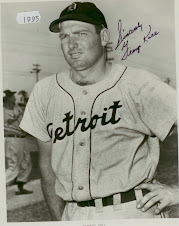I wish they had picked someone with some real managing experience, but they didn't ask my opinion. The reports have it that Ausmus is a "baseball brain," but honestly, I don't think the best managers know when to change pitchers, when to call the hit and run, pitchout, etc. I honestly think most of us could do that stuff.
I think there are two things a manager does that we never see, and probably make all the difference.
One is spotting the talent, and capitalizing on it. But managers have a whole squad of coaches, minor league managers and scouts to advise on that.
But the most important thing a manager does is the same thing a manager does in an office or shop: get the best out of his employees by creating a a workplace that doesn't distract, but supports and encourages.
Hopefully you've had a manager who has done that for you. Lordie knows most of us have seen the opposite.
Perhaps the worst example in sports is the current "drama" with Richie Incognito and the Miami Dolphins.
When the rookie wasn't coming to "optional" workouts, coaches told Incognito to "bring him in line." Regardless of what actually transpired, the coaches and management failed to do their job of "managing" this young talent. They gave that responsibility to Incognito, who clearly wasn't up to the task.
As soon as he was drafted (or maybe even before) team officials should be telling the rookie how much they were looking forward to having him on the team. Tell him they were relying on him. Tell him how important he was to their plans. These "volunteer" workouts were clearly a problem sign that something was wrong. (My Marine son-in-law calls this kind of thing being "volun-told.")
Maybe NFL rules don't allow coaches to order players to these sessions, but couldn't they call him, and ask him if everything is OK at home? Was there anything they could do to help him get to the workouts? Repeat messages from above, "we're relying on you, we need you, you can make a real difference, etc., etc.)
Instead of solving the problem, Miami coaches made it far worse.
Managing is not a skill most people are born with. Certainly some a better than others, but it's generally a skill that is taught and learned by experience. Let's hope Ausmus is an incredibly fast learner.
 I'll grant ya, I don't generally like change. I didn't like the Granderson trade, but I'm OK with it now. I didn't like the Harvey Keunn for Rocky Colavito trade, but I got over it. Of the three DMN columnists talking about the trade, two of them thought it was a great one for the Rangers.
I'll grant ya, I don't generally like change. I didn't like the Granderson trade, but I'm OK with it now. I didn't like the Harvey Keunn for Rocky Colavito trade, but I got over it. Of the three DMN columnists talking about the trade, two of them thought it was a great one for the Rangers. 





















